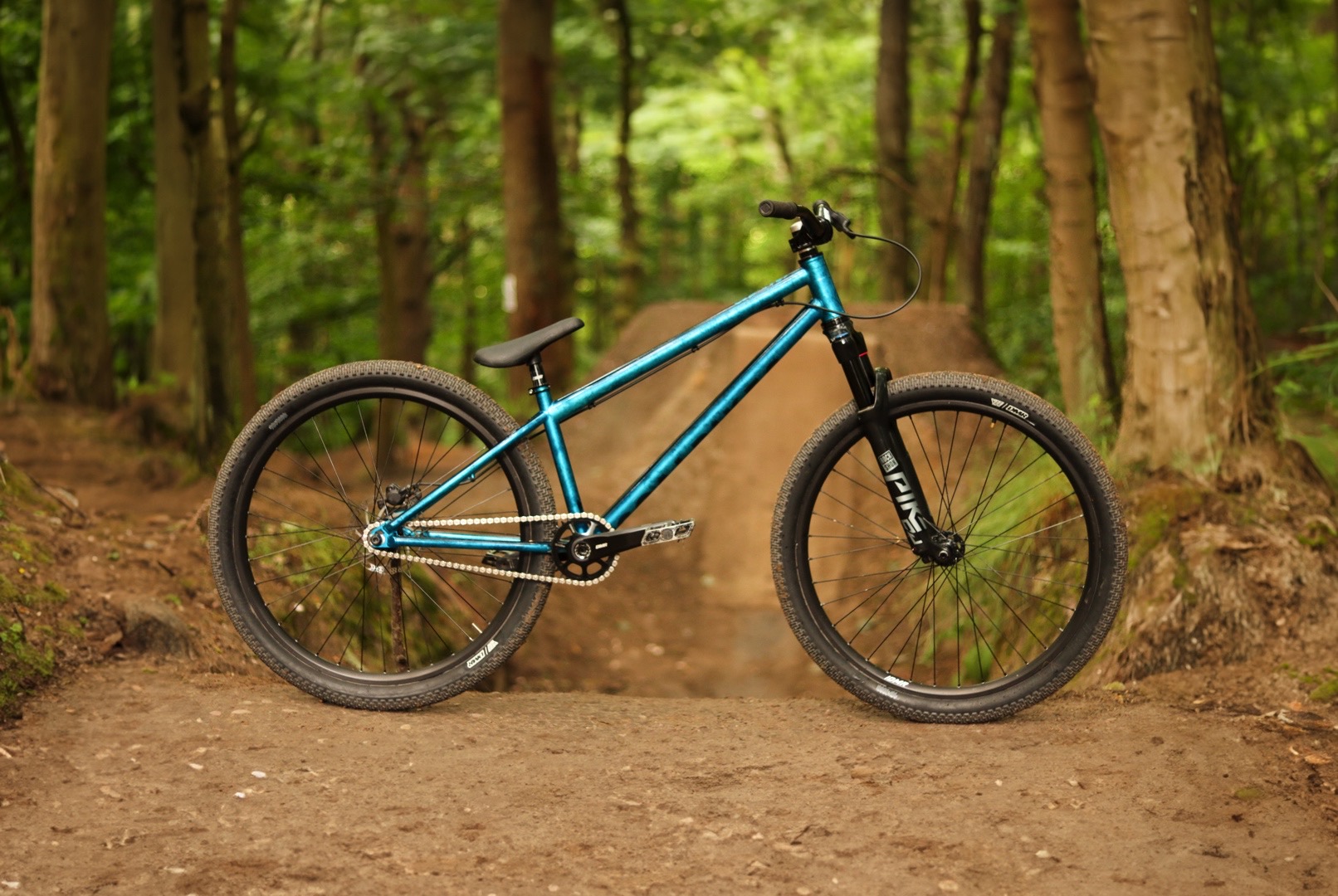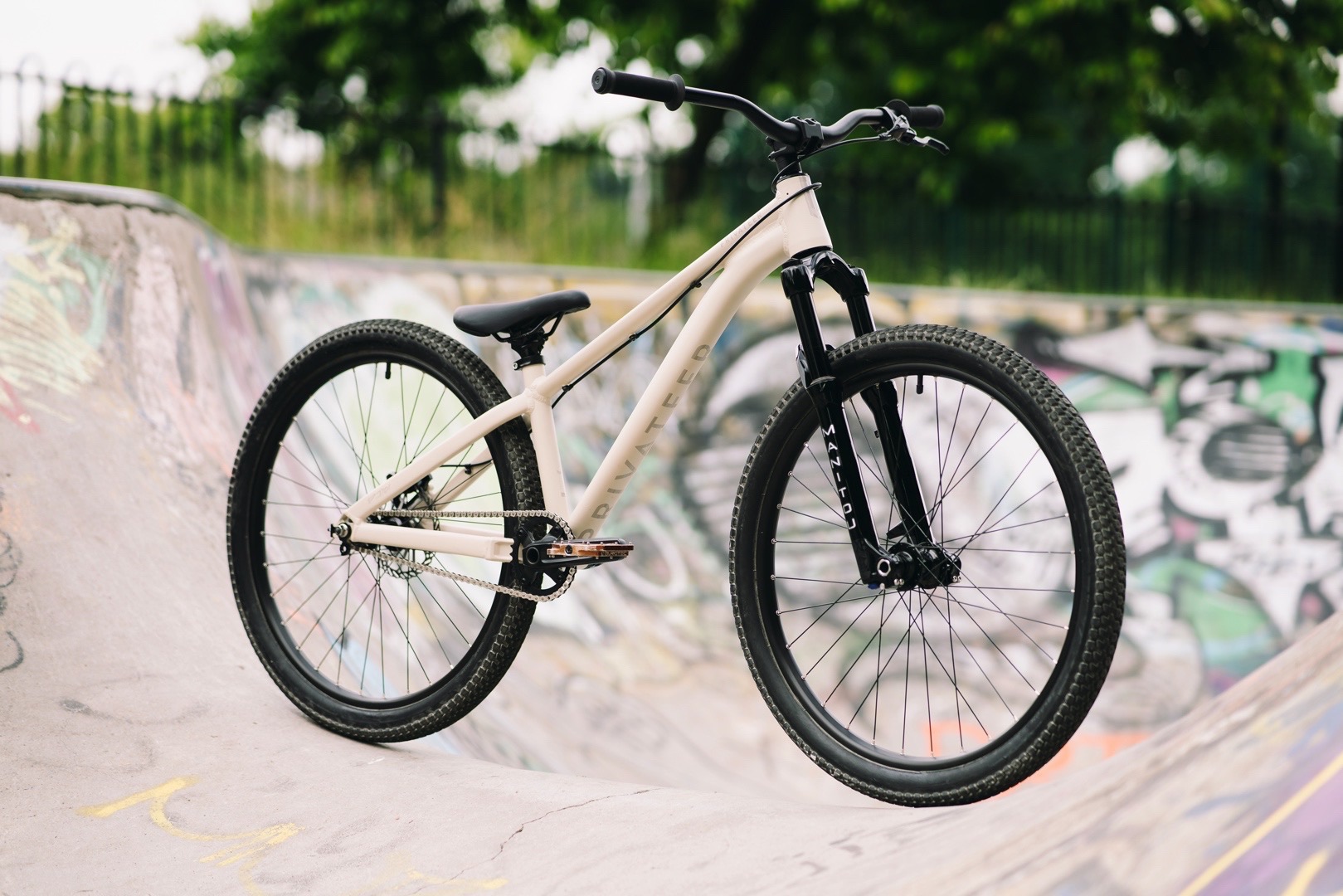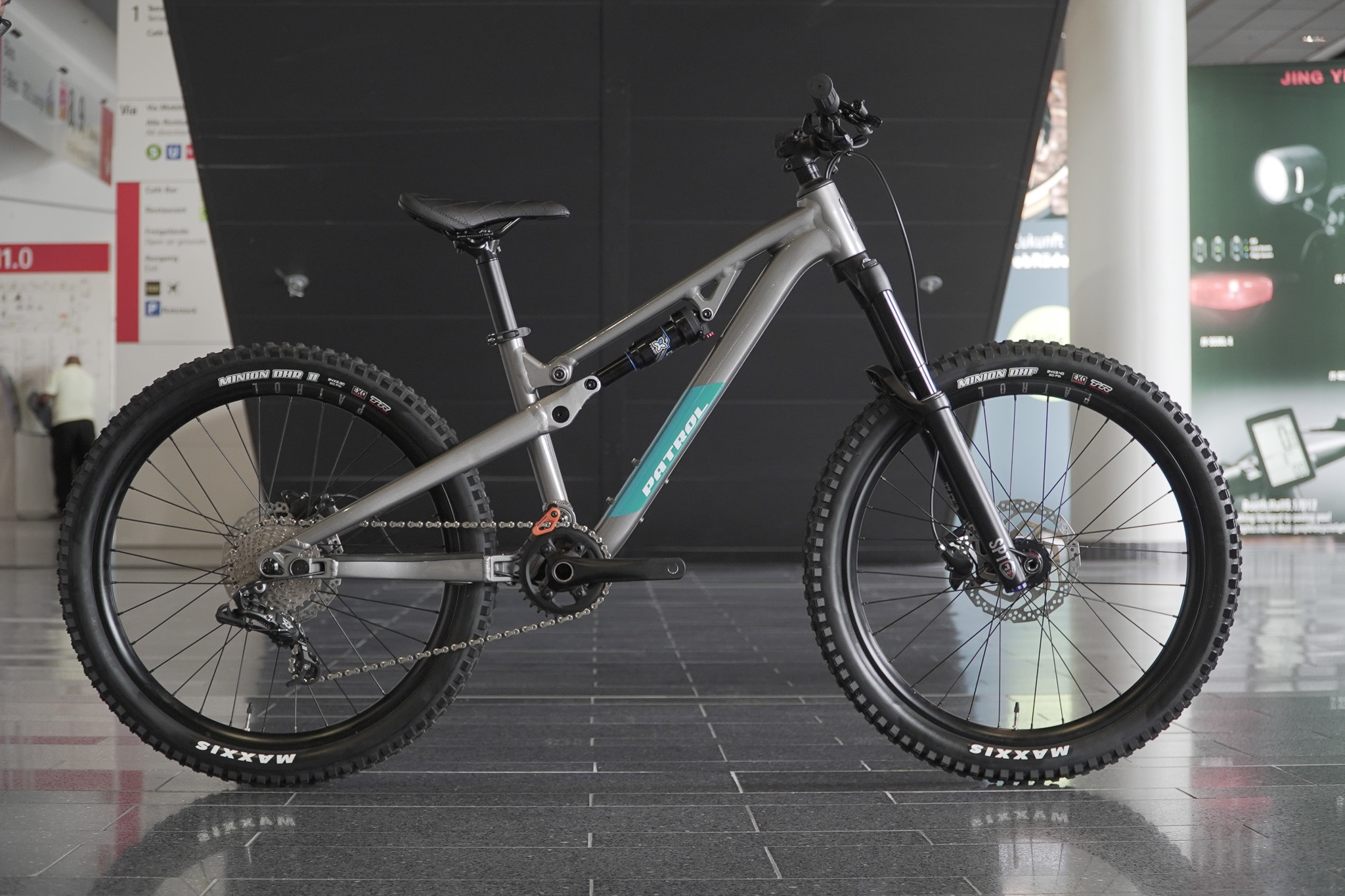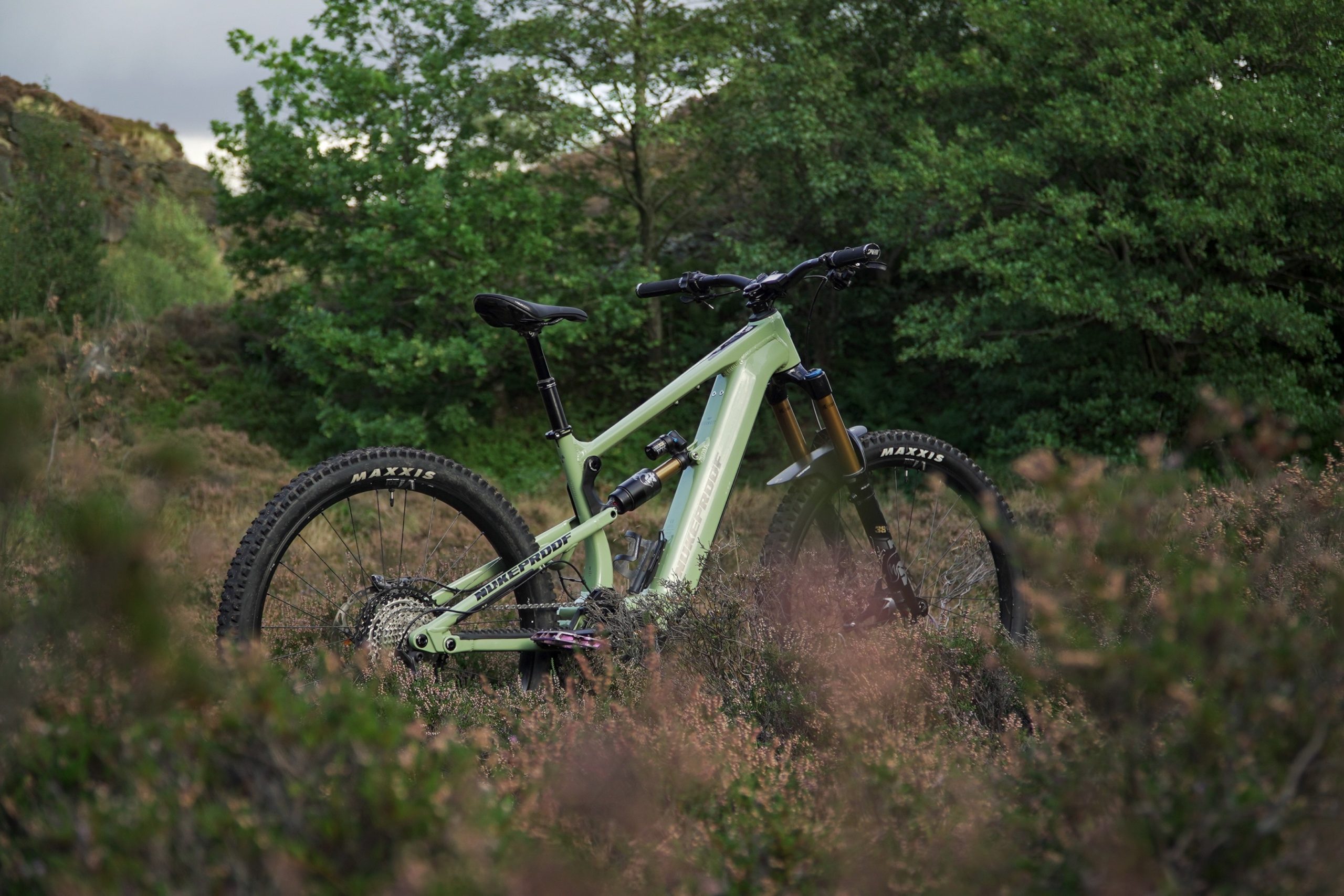If you have been around mountain biking as long as I have then Nukeproof won’t be a new name. Back in the 90’s Nukeproof, or Nukeproof Industries as it was called, pioneered the use of exotic materials and manufactured high-end carbon handlebars and innovative carbon bodied hubs.
Despite its popularity with mountain bikers, Nukeproof Industries struggled after the American bike boom and the name might have been relegated to the history books if not for downhill racer Michael Cowan. Michael combined his passion for racing with product development and soon launched a range of gravity orientated components, frames. Nukeproof latest frame though has a motor and battery integrated into it!
Nukeproof Megawatt Review – Design details and specifications
It’s fitting that Nukeproof chose to give its first eMTB the Megawatt name, after all the Mega was one of the frames which helped relaunch the Nukeproof brand back in 2010. Being named after such a popular and successful model, also meant that expectations were going to be pretty high for this eMTB, and it’s clear that Nukeproof took time to develop the Megawatt to create a bike that actually works rather than something to cash in on the eMTB boom.
While being quite late to the eMTB party, Nukeproof have actually been extremely wise. There can’t be many bike brands that can claim their first eMTB had an integrated battery, but waiting for technology to mature and listening to what customers actually want has helped Nukeproof leapfrog in the realm of assisted bikes.
Nukeproof will always be associated with high adrenaline and gravity riding, so it comes as no surprise that the Megawatt is an eMTB with a gravity bias to it, and so it needs the torque and range to access as many descents as possible. Inside the large alloy downtube, you’ll find a Shimano 625Wh battery, and slung beneath that the latest Shimano EP8 with 85Nm of Torque.
The updated EP8 system has 15nm more torque than the previous E8000 motor, and new firmware and app updates make it a whole lot more user-configurable. From the Shimano E-Tube app, you have access to tuning the various assist modes from max torque to power delivery. I tend to run Eco mode at around 23Nm, which is more than enough for most climbs and ensures I’m able to get as much riding done from the large battery. As an example, I was able to cover over 1544m of climbing during a 51km ride in the Peak District with the Megawatt and still had battery to spare for a road Boost back to the van!

Like any EP8 system, the Megawatt has 3 assist modes, Eco, Trail and Boost and each can be configured to how you want. I tend to leave EP8 bikes in Eco for big climbs then Boost for the downhill sections. For more flowing trails, Trail mode is where I like the EP8 to be.
Having all that torque on tap is all well and good, but it’s hardly useful if you can’t convert that to traction and forward movement. The Megawatt uses a mullet wheel configuration meaning a larger 29in wheel on the front with a smaller 27.5in wheel on the rear. It’s claimed that a smaller rear wheel ensures a more playful ride, and faster cornering. It’s difficult to quantify, but I do feel dual 29in wheels provide better all-out speed and traction.
A smaller rear wheel also has a few more advantages. Shorter riders will have more clearance and won’t receive a butt buzz as often when getting off the back of the bike, and a smaller wheel means shorter spokes and a stronger wheel. Important when the all aluminium Megawatt weighs in at a hefty 24kg. The wheels on our Factory spec Megawatt are DT-Swiss H1700 models show in Maxxis rubber, an Assegai on the front and High Roller II on the rear. To give you an understanding of how important it is for a weighty eMTB to have stronger components, I still managed to puncture the rear tyre despite it boasting a DD casing!
With the wheels and tyres sorted, the Megawatt needs to ensure they maintain traction in a rugged enduro/downhill setting so quality suspension is in order. In terms of rear suspension, we should not just look at the rear shock for performance but also the rear suspension linkage and kinematics. There would be no point bolting a high-end rear shock to a linkage that didn’t work, but we needn’t worry about the Megawatt, as the rear suspension is incredible.
Nukeproof based the suspension platform of the Megawatt on the Mega, with a slight change in Antisquat to enable a supple off the top feel for small bump compliance. That’s one of the benefits of having a motor, you’re able to adapt the suspension to retain traction and comfort without worrying too much about the pedalling performance. The supple of the top feel becomes more progressive through the travel with a supportive mid-stroke. On the trail the Megawatt doesn’t feel like a 170mm travel bike, it doesn’t wallow or bob around too much, yet there’s plenty of wheel movement to iron out rock gardens, steps and drops. The reduced anti-squat and improved off the top performance ensures the small rear wheel remains in contact with the ground on climbs too, this with 85Nm of torque available allows the Megawatt to tackle gradients you might not dream of on your standard Mega.
Controlling the rear wheel on our Factory Megawatt is a Fox Factory Float X2, at the front is a Fox Factory 38 producing an equal 170mm of travel. I’ll admit that I’m a huge fan of the updated Fox suspension with new updates to the Grip damper and VVC, but as fancy as a gold Kashima coating might look, I’d be just as happy on the cheaper black stanchions and save a little cash. A full complement of Enduro sealed bearings should ensure smooth operation and minimal maintenance.
The 29er fork fits the aluminium frame via a 64-degree head angle, suitably slack for a gravity focussed bike. This is matched to a 77.5-degree effective seat tube angle on our medium-sized test bike, but larger bikes get a 78-degree seat angle. This is as about as steep as I would like to get, it gives a nice seated position that feels much more compact than the 455mm reach might suggest for an efficient seated position. The steeper seat angle also helps to keep your body centred which keeps the rear wheel in contact with loose terrain on the climbs but prevents the front wheel from floating when ascends become especially steep.
Nukeproof has followed modern frame design trends with a short seat tube with enough clearance to slam a long dropper. This means that this size medium bike suits riders from 167cm – 177cm, and I would say that I agree with this sizing as at 178cm I find myself wishing the longer reach of a size large frame. The beauty of the lower seat tube and long dropper though means it’s very easy to size up or down and find a frame size that you’re 100% comfortable with.
Nukeproof Megawatt Review – Geometry
| SMALL | MEDIUM | LARGE | X-LARGE | XX-LARGE | |
|---|---|---|---|---|---|
| (A) REACH | 435 | 455 | 475 | 495 | 515 |
| (B) STACK | 640.74 | 640.74 | 645.24 | 654.23 | 663.21 |
| (C) EFFECTIVE TOP TUBE LENGTH | 577.05 | 597.05 | 612.15 | 634.06 | 663.21 |
| (D) SEATTUBE LENGTH | 380 | 410 | 440 | 470 | 500 |
| (E) EFFECTIVE SEATTUBE ANGLE | 77.5 | 77.5 | 78 | 78 | 78 |
| (F) SEATTUBE ANGLE (ACTUAL) | 71 | 71 | 72 | 72 | 72 |
| (G) SADDLE HEIGHT AT SADDLE OFFSET | 650 | 700 | 750 | 800 | 850 |
| (H) SADDLE OFFSET AT SADDLE HEIGHT | 139.98 | 156.36 | 163.32 | 178.84 | 194.35 |
| (I) HEADTUBE LENGTH | 115 | 115 | 120 | 130 | 140 |
| (J) HEADTUBE ANGLE | 64 | 64 | 64 | 64 | 64 |
| (K) CHAINSTAY LENGTH | 442 | 442 | 442 | 442 | 442 |
| (L) FRONT CENTRE | 779.61 | 799.61 | 821.8 | 846.18 | 870.57 |
| (M) WHEELBASE | 1221.5 | 1241.5 | 1263.69 | 1288.07 | 1312.46 |
| (N) BOTTOM BRACKET DROP (FRONT / REAR) | 30/10 | 30/10 | 30/10 | 30/10 | 30/10 |
| (O) BOTTOM BRACKET HEIGHT | 345 | 345 | 345 | 345 | 345 |
| (P) STAND OVER HEIGHT | 734.8 | 731.06 | 730.01 | 732.88 | 732.69 |
| (Q) FORK TRAVEL | 170 | 170 | 170 | 170 | 170 |
| (R) TRAIL | 136.17 | 136.17 | 136.17 | 136.17 | 136.17 |
| (S) FORK OFFSET | 44 | 44 | 44 | 44 | 44 |
| (T) AXLE TO CROWN | 582 | 582 | 582 | 582 | 582 |
| (U) MAXIMUM SEATPOST INSERT | 216 | 248 | 275 | 305 | 340 |
As mentioned in the intro, Nukeproof develops and sells a lot of it own components, so its hardly surprising to see plenty of Nukeproof branded kit on this Factory bike. In the past, own brand componentry was seen as a cost-cutting measure, but Nukeproof makes a lot of product that ends up on dream builds, so I was extremely happy with the NP branded 800mm bar, 50mm stem, saddle and grips.
I was also really happy to see a BikeYoke dropper post on the Megawatt. BikeYoke makes some of the smoothest droppers on the market, and they tend to require less servicing than other brand dropper posts. Our medium-sized back has a 160mm dropper, XL and XXL bikes gain a 185mm post.
Nukeproof Megawatt Review – Riding the Megawatt
Climbing
With almost the same kinematic and anti-squat as the non-motorised Mega, the Megawatt is unsurprisingly a very capable climber. While featuring a lower value than the Mega, the anti-squat on the Megawatt actually increases in the climbing gears while dropping off slightly in lower gears for descending. This ensures the rear suspension flutters nicely over loose terrain for maximum climbing traction, and that’s especially important when the EP8 motor knocks out 85Nm of torque. Chances are you won’t be Boosting up many climbs though, and even in Trail, Eco or a detuned Eco mode, as I run it, the Megawatt has more than enough grunt and grip to conquer even the most gruelling climbs.
Our Factory build bike is fitted has a compressions lever on the rear shock which helps to firm the rear end up if needed, but with our prefered suspension setting we never felt the need to use it.
With the 4 bar suspension ensuring traction, the modern geometry keeps the rider in a comfortable position with the steep seat tube angle ensuring that the rider can muscle their way up the climbs, or just sit back and let the motor do its thing.

Descending
A 170mm travel eMTB might climb exceptionally well, but climbing is only a means to an end on a bike like this. What we really want to know is just how well it handles on the way back down again.
Running a full compliment of Enduro Max bearings throughout the rear suspension and featuring a lower shock bearing, the rear end is buttery smooth through its travel. The slightly lower Anti-squat and smooth action ensure even the smallest trail obstacle is absorbed through the rear suspension. The Megawatt manages this without any unwanted bob, and without feeling like too much of a burly bruise, and this weighty eeb still manages to have a playful characteristic. While lifting the Megawatt over a fence reveals its weight, all those lbs melt away on the trail making direction changes a breeze
The frame and rear suspension are backed up with a solid assortment of kit that opens up the full descending potential of the Nukeproof. Strong wheels, quality rubber, and powerful brakes all mean that every second of downhill speed you make on the steeps is safely transformed into a cornering grip.
If we had one complaint about the Megawatt when riding downhill it would be the Shimano EP8 motor. While not as noisy as they originally were, the Shimano motor does have a slight rattle to it, but it’s a noise most riders generally get used to very quickly.
Is there anything we would change about the Megawatt?
The Megawatt is obviously a great bike, but even the best of bikes can be improved upon and there are a few small areas we think Nukeproof’s first eMTB can be made even better, but neither is a deal-breaker.
A Double Down tyre on the rear is a no brainer on a heavy eMTB like the Megawatt and we commend Nukeproof for this, but as we’ve found during many bike tests, the white label Maxxis tyres aren’t strong enough. Maxxis tyres with a white logo are OE parts, in other words, only manufacturers can buy and spec them on their bikes. Reading through the specs there is no difference between a white label Maxxis tyre and an aftermarket yellow label tyre. However, we’ve long suspected that OE tyres aren’t as strong and the advent of eBikes has proven this with many many punctures.
Another area that needs a little extra strength is the Shimano XT chain. Shimano claims that their chains are suitable for ebikes, but we’ve managed to break a few and the Shimano XT M8100 HG chain on the Megawatt was no exception. An eMTB specific chain would be preferable and we recommend riding with a spare quick-link and trail side chain tool to fix any issues you might run into.
Finally, there is a small plastic bridge that holds the gear cable and brake hose at a fixed length behind the motor. It often unclips and we’re constantly expecting it to disappear during a ride.
Overall
We may have pointed out a few niggles, but nothing takes away the shine and pure joy the Megawatt delivers. Nukeproof’s engineers have adapted the suspension perfectly for the additional torque and speed the Shimano EP8 delivers. With 170mm of travel front and rear, the Megawatt is perfectly suited to shuttling at the bike park, but it’s also capable of so much more. If you’re dreaming of a big travel bike that you can take anywhere, the Nukeproof Megawatt may well be it!
Well, we hope we covered all the bases in our review of the Nukeproof Megawatt if you have any questions or comments head into our forum and fire away!














